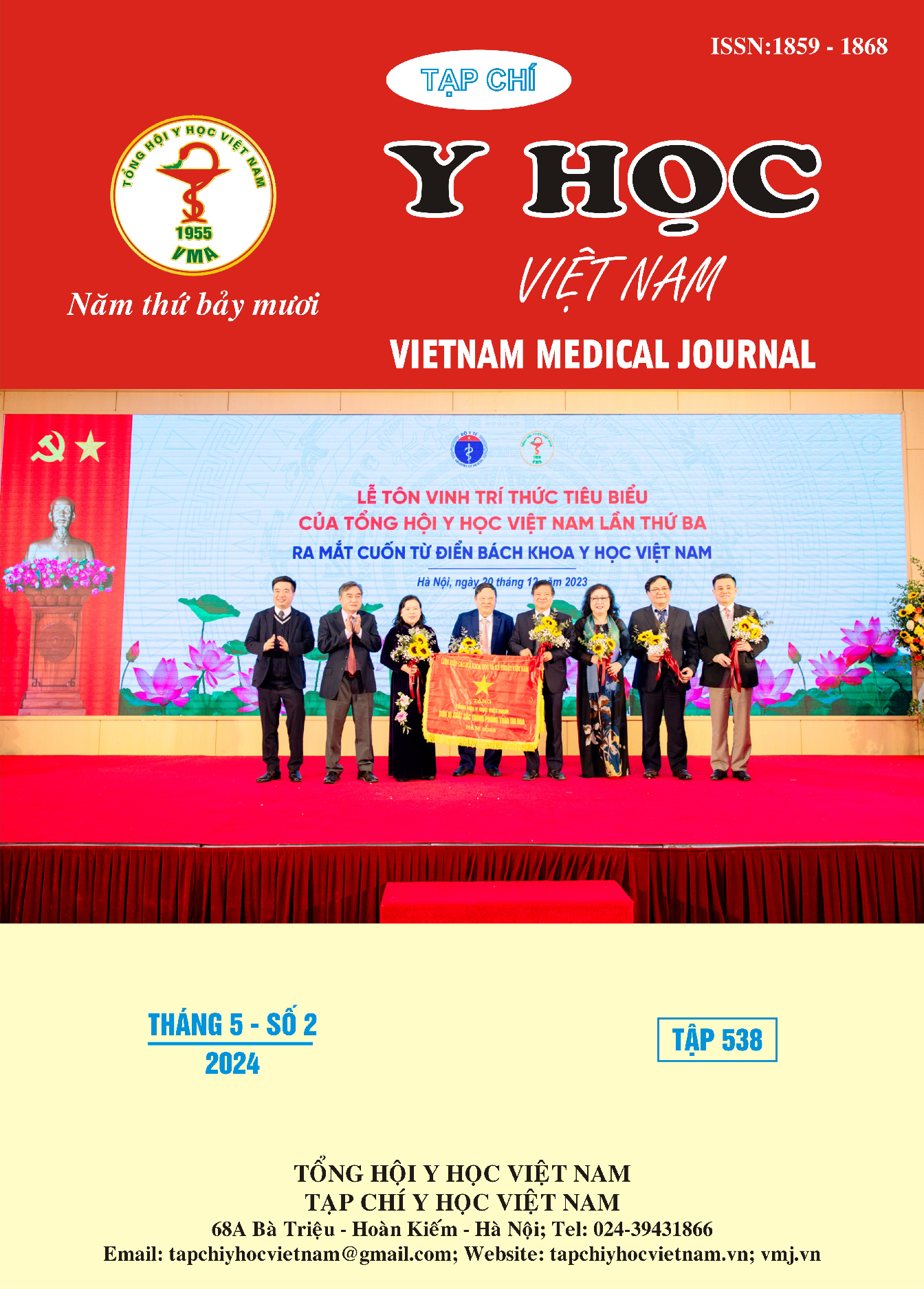FACTORS AFFECTING PATIENT'S ANXIETY LEVEL BEFORE SURGERY FOR BENIGN THYROID TUMOR AT THE CENTRAL ENDOCRINE HOSPITAL
Main Article Content
Abstract
Objectives: Describe factors affecting the anxiety level of patients before surgery for benign thyroid tumors at the National Endocrinology Hospital in 2023. Methods: Cross-sectional descriptive study design with convenience sampling method and self-completed questionnaire to describe factors affecting the patient's preoperative anxiety level. Results: 4.9% of patients did not have anxiety, 79.6% of patients had mild anxiety, 15.5% of patients had moderate anxiety and no patients had severe anxiety. The proportion of male patients with mild/moderate anxiety is 63.2%/10.5%, the proportion of male patients with mild/moderate anxiety is 81.8%/16.1%. Patients under 50 years old have lower rates of mild and moderate anxiety than patients over 50 years old. Among people with mild anxiety, 87.2% are economically independent, 78.3% are partially dependent, 46.7% are completely dependent, the rate gradually increases in people with moderate anxiety, respectively. 6.4%/17.4%/53.3%. 17.9% of patients who have had surgery and 2.2% of patients who have never had surgery are not anxious. 18.6% of patients had never had surgery for moderate anxiety and no patients had ever had surgery for moderate anxiety. Conclusion: Before surgery for benign thyroid tumors, patients have different levels of anxiety: no anxiety, mild anxiety, moderate anxiety. Factors that affect the patient's anxiety level before surgery for benign thyroid tumors include: female gender has more severe anxiety than men, and advanced age increases anxiety levels. Independent economic status, previous surgical experience, and using the right health insurance help reduce the level of anxiety before surgery.
Article Details
Keywords
anxiety, before surgery, thyroid tumors.
References
2. Nguyễn Xuân Hậu, Lê Đức Anh (2022). Đặc điểm lâm sàng, cận lâm sàng u tuyến giáp lành tính được phẫu thuật nội soi tuyến giáp qua đường miệng, Tạp chí Y học Việt Nam, tập 516 – tháng 7 – số 2 - 2022, tr. 290 - 293.
3. Phạm Thị Thu Hương (2022). Thực trạng lo âu và nhu cầu hỗ trợ tâm lý ở người bệnh trước phẫu thuật tuyến giáp tại bệnh viện Nội tiết Trung ương, Luận văn Thạc sĩ Điều dưỡng, Trường Đại học Điều dưỡng Nam Định.
4. Hoàng Việt Thái (2021), Khảo sát mức độ lo âu trước phẫu thuật và tìm hiểu một số yếu tố liên quan của người bệnh gãy xương chi tại khoa chấn thương bệnh viện Trung ương Thái Nguyên, Luận văn Thạc sỹ Điều dưỡng, trường Đại học Y Hà Nội.
5. Ay A, Ulucanlar H, OzennM et al (2014), Risk factors for perioperative anxiety in laparoscopic surgery, JSLS.18(3).
6. Henok Mulugeta, Mulatu Ayana, Mezinew Sintayehu, Getenet Dessie, Tesfu Zewdu (2018), Preoperative anxiety and associated factors among adult surgical patients in Debre Markos and Felege Hiwot referral hospitals, Northwest Ethiopia. BMC Anesthesiology, volume 18, Article number: 155 (2018).
7. Jiwanmall M, Jiwanmall S, Williams A et al (2020), Preoperative Anxiety in Adult Patients Undergoing day care surgery. Prevalence and Associated Factors, Indian J Psychol Med. 42(1), 87-92.
8. Jun-Seok Lee, Yong-Moon Park, Kee-Yong Ha, Sung-Wook Cho, Geun-Hyeong Bak, Ki-Won Kim (2016). Preoperative anxiety about spinal surgery under general anesthesia. European Spine Journal, volume 25, pages698–707 (2016).
9. Krzysztof Jarmoszewicz, Katarzyna Nowicka-Sauer, Adam Zemła & Sebastian Beta (2020). Factors Associated with High Preoperative Anxiety: Results from Cluster Analysis. World Journal of Surgery volume 44, pages2162–2169 (2020).


